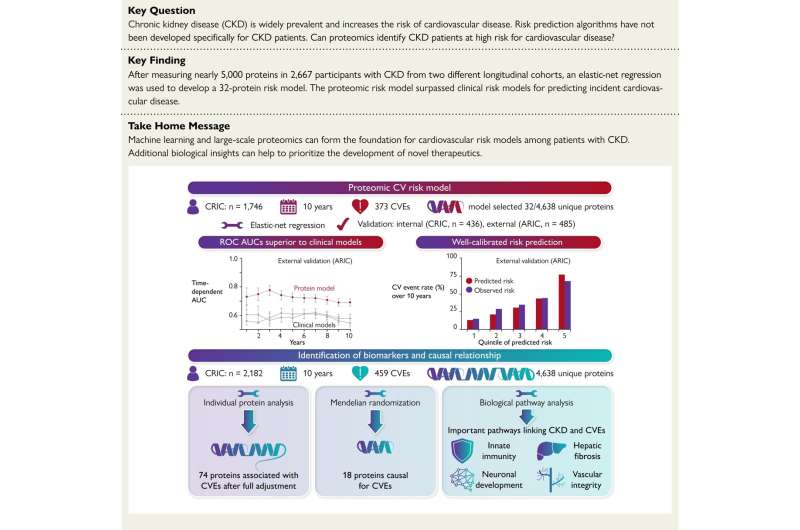This article has been reviewed according to Science X's editorial process and policies. Editors have highlighted the following attributes while ensuring the content's credibility:
fact-checked
peer-reviewed publication
trusted source
proofread
New model predicts cardiovascular risk among chronic kidney disease patients

Chronic kidney disease (CKD) is a strong cardiovascular risk factor and is often accompanied by hypertension and diabetes. Despite the disease's prevalence—10 percent of individuals across the globe suffer from CKD—there are limited tools for measuring cardiac risk for CKD patients, until now. A new proteomic risk model for cardiovascular disease was found to be more accurate than current methods of measuring cardiac risk, according to a new study led by researchers in the Perelman School of Medicine at the University of Pennsylvania. The study published today in the European Heart Journal.
The Penn researchers developed a model using proteomics, the large scale study of proteins. The proteins act as a type of biomarker, which can be used to help identify diseases in the body. The researchers studied nearly 5,000 proteins in 2,667 participants with CKD from the Chronic Renal Insufficiency Cohort (CRIC) and the Atherosclerosis Risk in Communities (ARIC) cohort. All participants had CKD and no history of cardiovascular disease at study baseline.
The team, from Penn, Johns Hopkins, and the University of California San Francisco, used a drop of blood from participants to predict a patient's risk for a cardiac event. With the model, they evaluated 4,628 unique proteins to find which could most closely help identify risk of cardiovascular disease. Of those thousands of proteins evaluated, researchers used machine learning methods to choose 32 proteins that comprised their proteomic risk model. Those specific proteins were determined to best help indicate a patient's risk level of heart attack, heart failure, stroke, or even cardiovascular death in those with CKD.
"The future is bright. In an era of personalized medicine, these findings indicate a new route for future research into therapeutic targets," said Rajat Deo, MD, MTR, an associate professor of Cardiovascular Medicine at Penn Medicine. "The ability to personalize risk assessment for individual patients with CKD is the first step toward scaling this for larger health systems."
This new model was found to be more accurate in identifying those at risk of future cardiovascular disease, as compared to both the 2013 ACC/AHA Pooled Cohort Equation (PCE)—which provides a set of guidelines for best practices in measuring cardiovascular risk—and a modified PCE that included estimated glomerular filtrate rate (eGFR). An eGFR lets doctors know how much of a certain waste product, called creatinine, is in someone's blood.
Those in the highest measure of predicted risk had an observed incident cardiovascular event rate of 60 percent over 10 years. The reliable identification of such high-risk individuals with no prior history of cardiovascular disease will undoubtedly be of great interest to patients and their providers for preventative care measures.
Not only did the study indicate this model was more accurate compared to current approaches, the researchers were able to identify several proteins, like cartilage intermediate layer protein 2 (CILP2), that can be used in future research to identify cardiac risk or be the target for novel therapies.
All data connected to this study will be publicly available. "We're laying it all out for researchers around the world to be able to access and make further strides in this field," said Deo.
More information: Rajat Deo et al, Proteomic cardiovascular risk assessment in chronic kidney disease, European Heart Journal (2023). DOI: 10.1093/eurheartj/ehad115



















